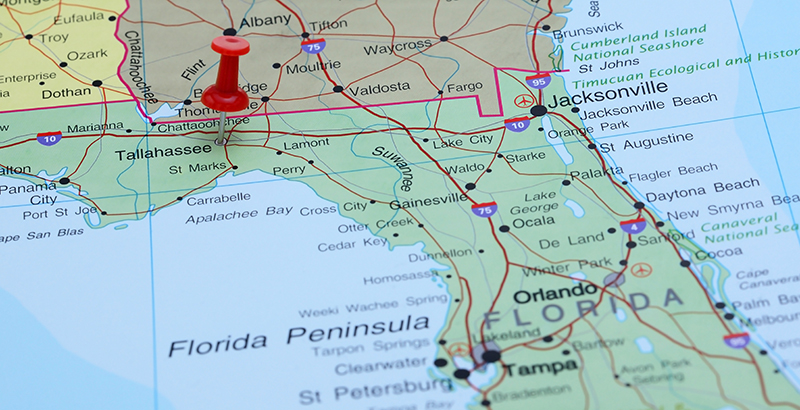Tuthill: Florida School Choice Army Grows as Charter School Parents Join Voucher Families in Advocacy Network

When people raise their voices together, they get heard. We’re seeing that in Florida right now, with thousands of students and families, spurred by the horrific tragedy at Marjory Stoneman Douglas High School, flooding the state Capitol and passionately demanding changes in gun and mental health laws.
For the first time I can recall — and I’m a fourth-generation Floridian — bipartisan progress appears not just possible, but likely.
We saw something strikingly similar two years ago, when 10,000 school choice supporters, most of them black and Hispanic, also rallied near the Capitol. With Martin Luther King III, son of the civil rights icon, as the keynote speaker, they demanded that the state teachers union drop its lawsuit against the Florida Tax Credit Scholarship, the largest private school choice program in America. The union didn’t drop its suit, but the rally generated front-page headlines statewide and shattered the bogus union narrative about right-wing cabals. Ultimately, the Florida Supreme Court dismissed the suit, and — who knows? — maybe some of the justices, who could see the rally from the Supreme Court building, were moved by the voices raised that day.
This is the power of a unified, amplified voice. And we’re just beginning to turn up the volume.
Under the direction of the Florida Parent Network, Step Up for Students is adding thousands of committed new voices to Florida’s school choice army. We recently formed a partnership that will combine the organizing and communications efforts of the Florida Parent Network, the Florida Charter School Alliance, and Charter Schools USA. This is groundbreaking.
The network trains parents to advocate for their children. Until now, we focused on those whose children received tax credit scholarships for lower-income families, the McKay Scholarship for students with disabilities, or the Gardiner Scholarship, an education savings account for students with special needs. But now, we’re adding charter school parents to the fold.
Together, the scholarship programs serve nearly 150,000 students. Florida charter schools, meanwhile, serve nearly 300,000 kids. Those numbers say a lot about the potential power of this partnership.
And the partnership says a lot about the unity of Florida’s school choice movement.
I’ve winced in recent years at some of the feuds I’ve seen in other states, and nationally, between school choice factions. The tensions have been particularly tough within the Democratic Party.
As a former teachers union leader and lifelong Democrat, I understand the political pressures school-choice Democrats face. Presidents Bill Clinton and Barack Obama gave Democrats political cover to support charter schools, but President Trump’s backing of school choice makes all forms, including charters, increasingly toxic for Democrats. Consequently, some pro-charter Democrats now oppose private school choice to maintain their standing within the party.
But acquiescing to, and collaborating with, our critics’ divide-and-conquer strategy is a bad idea. My former union colleagues oppose all choice programs not under collective bargaining agreements — but pro-charter Democrats are mistaken if they think opposing private school choice is going to cause teachers unions and their allies to soften their opposition to nonunionized charter schools.
What will help ease the way for Democratic leaders to return to the fold and go all in on every school choice option? If school-choice parents of all stripes, including charter and voucher families, stand together. It’s harder for Democratic leaders to splinter if their constituents are unified.
In Florida, we’ve worked for years to build bridges between choice groups. Before the network formed last year, we collaborated under an umbrella organization called the Florida Alliance for Choices in Education. Our meetings resembled a gathering of tribes from The Lord of the Rings.
Representatives from nearly all of Florida’s choice programs came together, including district-run options. Folks from private schools, charter schools, magnet schools, virtual schools, and homeschool groups shared their successes, concerns, and challenges and got feedback from one another. It sounds remarkable. Yet in a state where 1.7 million students in pre-K–12 now attend something other than their zoned neighborhood schools, it makes perfect sense.
This earlier partnership opened doors to the kind of dialogue I fully expect will occur even more frequently with our new pact.
All of us must wrangle with complex issues that overlay public education at this key point of transition from neighborhood schools to school choice to educational choice — moving beyond just picking schools to mixing and matching all kinds of different educational programs, à la carte, to craft truly personalized educational experiences that parents deem best for their children’s needs. Finding the proper balance between government regulations and parental choice, in order to establish accountability and drive quality, is difficult in every sector, be it district, charter, or private. We have diverse opinions about how much testing, if any, should be required; whether accreditation and teacher certification bring value; what funding levels are adequate and equitable. But by focusing on our shared values and mission and engaging in respectful, fact-based dialogue, I know we’ll arrive at compromises that strengthen our programs and relationships and empower more families.
This willingness to listen and compromise is common sense to us. Why would charter and private school choice advocates not collectively embrace the goal of providing all parents with access to schools that best meet their child’s needs? Who cares if the school they choose is a traditional neighborhood school, magnet school, charter school, home school, private school, or virtual school? We just want to enable all parents to find and access the best school for their child.
With our new partnership, we’ll get there faster. In the meantime, we won’t be shy about speaking up.
Doug Tuthill is president of Step Up for Students, a nonprofit that administers the Florida Tax Credit Scholarship and Gardiner Scholarship.
Get stories like these delivered straight to your inbox. Sign up for The 74 Newsletter

;)